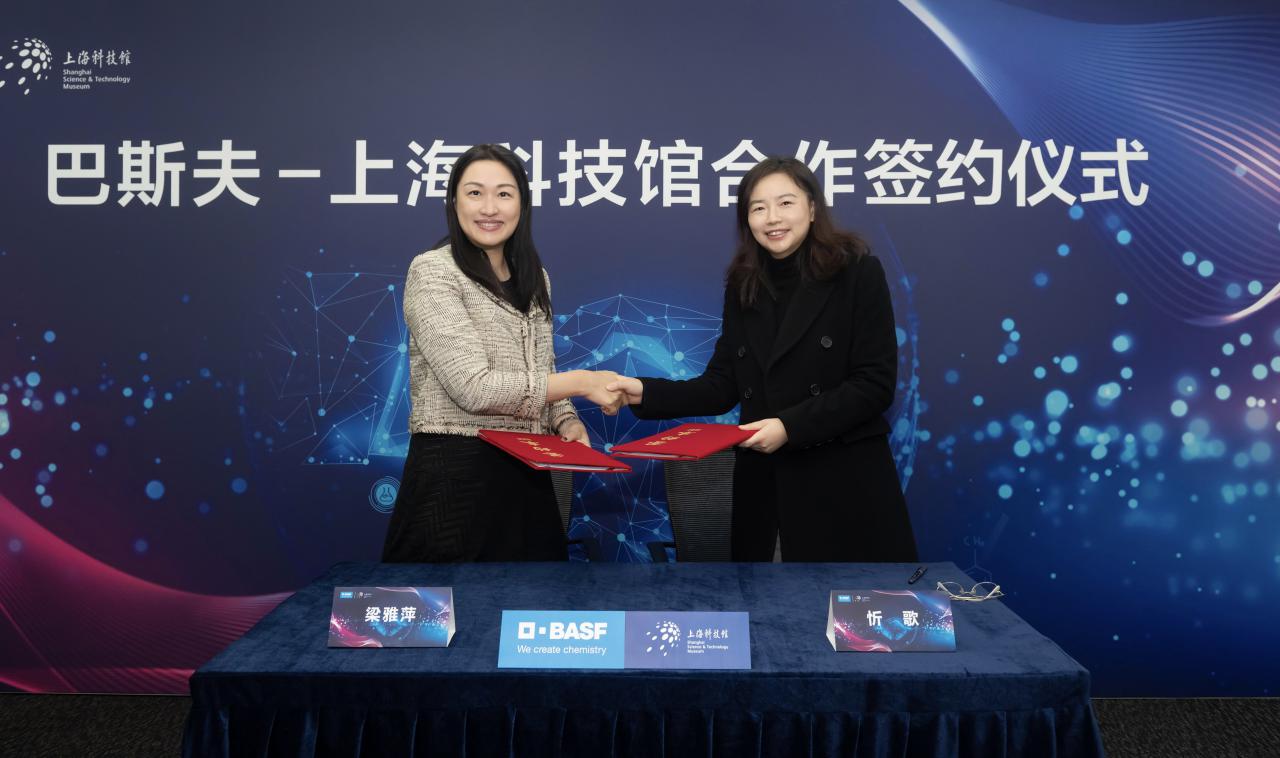● Renew the strategic cooperation letter of intent to further integrate the superior resources of both parties and promote science popularization and innovation
● The long-term cooperation “BASF Little Chemists” project has attracted more than 90,000 children to participate in Shanghai so far

On December 20, 2023, the Shanghai Science and Technology Museum and BASF renewed the letter of intent on the strategic cooperation framework to further expand the strategic partnership and promote science education for teenagers. The update of the agreement will further integrate the superior resources of both parties, strengthen the joint construction of museums and enterprises, and inject new vitality into the scientific training of young people.
Shanghai Science and Technology Museum and BASF adhere to a common philosophy and have long been committed to promoting popular science education for domestic children. Since 2005
Since 2009, the two parties have jointly hosted the “BASF Little Chemists” project in Shanghai, which has been widely recognized by all sectors of society. This science popularization project specially designed for school-age children has attracted more than 90,000 children in Shanghai to participate.
In 2018, the two parties signed a strategic cooperation agreement and made considerable progress in resource sharing, personnel exchanges, curriculum development and public science popularization. With this renewal, the two parties will further expand their partnership and vigorously promote popular science education for young people, especially the popular education of chemistry. At the signing ceremony held today, BASF also donated to the Shanghai Science and Technology Museum
300 copies of the popular science picture book “Cooling the Earth – Becoming a Low-Carbon Family” will be used to support the science education activities of the Shanghai Science and Technology Museum.
At the same time, relying on its experience in chemical science popularization, BASF will invest more resources to assist in the renovation of the materials exhibition area of the Shanghai Science and Technology Museum, and jointly create a more innovative and interactive science popularization education platform.
Xin Ge, deputy director of the Shanghai Science and Technology Museum, said: “Science popularization can help the general public understand science and keep up with the development of the times, and it is also an important way to cultivate future scientific and technological talents. We hope to join forces with BASF to create more for children. Opportunities for hands-on practice, and experiences that are ‘straight to the soul’ gained through exploration. Going into the laboratory together to see the latest scientific research results and learn more advanced cultural concepts will also be more conducive to the public’s understanding and experience of the technology itself.”
BASF Vice President, Greater China People Services
Liang Yaping, the person in charge, said: “BASF knows that science education is of great significance to the younger generation. This requires not only a good scientific training environment, but also the joint efforts of the whole society. We will continue to work with partners such as the Shanghai Science and Technology Museum to integrate The resource advantages and the close cooperation between museums and enterprises will work together to cultivate future leaders and innovators.”
The strategic cooperation between the two parties also includes creating a series of popular science education activities, including:
1) “Enter BASF – Science Open Day” Educational practice project: The two parties will jointly plan and organize young people of appropriate age to visit BASF’s production base in Shanghai to understand the daily work of R&D personnel and establish a basic understanding of the chemical industry ;
2) Chemistry themed education activities: The Shanghai Science and Technology Museum will invite BASF scientists to conduct popular science lectures, salons, seminars, themed tours, etc. from time to time to help the public understand the impact of chemical innovation on daily life and climate protection. huge contribution.
3) “BASF Chemical Experiment Base” activity: Based on the introduction of chemistry course resources developed by BASF’s German headquarters, the two parties integrated BASF’s insights into industrial production practices to develop and design a series of new experimental courses. Help the normalization of chemistry courses at the Shanghai Science and Technology Museum.

 微信扫一扫打赏
微信扫一扫打赏

